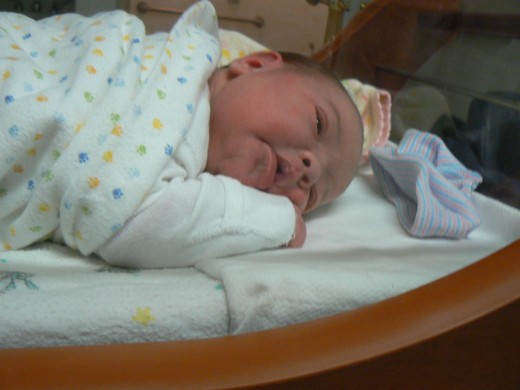- HubPages»
- Family and Parenting»
- Parenting Skills, Styles & Advice»
- Parenting Advice & Tips
Teaching Children Trust

Trust is Like a House
Trust is like a house that is built around the child, providing protection from hurt and danger. The child is able to sense it's presence, even though unseen. Trust is an assurance that needs will be met. It is first learned as the parent provides love, food, warmth, shelter, and comfort to the infant.
Tuning into the infant's sound and movements, the parent learns to discern what need is pressing, and develops a relationship with the infant as that need is met. Ideally, the mother is the primary caregiver, as the infant comes from the warmth of her womb and is familiar with her smell, sound, and heartbeat.
Should this position be abdicated for whatever reason, the consistency with which another caregiver remains in the child's life determines the level of trust the child has. Children who are left in the care of others since birth, with no primary caregiver, develop a sense of anger and mistrust in others.

The Foundation of Unconditional Love
The foundation of the house of trust is unconditional love. The gentle touch, the soft cooing of the voice, holding of the infant close to the body, and the provision of nourishment brings comfort. The infant is reminded of life inside the womb, where every need is filled immediately. Growth and development are possible.
Now, in a very different place, the infant longs for security. Infants who do not establish a trusting relationship with a primary caregiver will fail to thrive, and are known to waste away and die. Dependent upon others for life itself, the infant can only respond to the environment in which it finds itself. Total acceptance and loving care provide the foundation for the child's future.
As the child grows and develops, the need for unconditional love and acceptance never change, yet are manifest in different ways. The toddler will frequently ask to be held and will cry when harsh words or actions are used for discipline. Talking in a soft voice, giving hugs and kisses, and teaching about the world let the child know that love is available and will be given in abundance.
Even children in later childhood or the teen years need to know that they are unconditionally loved. A soft touch, a hug, a kiss, and seeing that their basic needs are met continues to send the message that they are worthwhile as human beings. Teaching them the things they need to know about the world in order to be safe gives added dimension to trust.

Establishing Boundaries - The Walls of Trust
Boundaries are the walls of the house of trust. They protect from the weather and unpredictable elements and provide a haven of safety. When a child knows where the boundaries are, and they are clear and consistent, the child feels safe and secure. The boundary keeps those things that might hurt or injure away and gives a limit to choices that are made.
The boundaries built around a child or adolescent must be built according to physical and mental capabilities. A toddler's boundary will be different than that of ten-year-old. Boundaries can and must be set first by the parents, then the child is willing to be subject to the boundaries set by school, church, and society. If a parent does not set and enforce boundaries for the child at a young age, it will be difficult to set them when the child is older.
Increasing the perimeter of the boundaries as a child gets older expands the realm of trust. Overprotection on the part of the parent can be very annoying to a grade-schooler. Allowing the child to make his own choices regarding personal grooming (i.e. what to wear, how to fix the hair, etc.), where things are located in the bedroom, and how to make the bed are vital to the growth of trust in the self. Boundaries must be set to the standards of the family (i.e. clothing needs to be clean, in good repair, taken care of, and modest). General guidelines and accountability are necessary and always will be in fostering independence.
Children will test the limits. Parents reiterate the boundary and the principle behind it. Consequences are followed through, and the parent allows the child to experience the consequences, although they may be distasteful, the child will learn from them, and choose more wisely in the future. The more a child is able to show adherence to boundaries, the more responsibility he or she is able to handle. Letting the child know that more freedom will come when the boundaries are respected gives a desire to do better.

The Roof of Dependability
Once unconditional love is shown and boundaries are well established, the "roof of dependability" needs to be added. Dependability means that one will do what one says they will do. Whether a parent or child, dependability leads to greater trust of one another. The parent that is available when a child needs help adds security and safety to the trust relationship.
There are key moments in the day when children are especially vulnerable to the need for security. One is in the morning prior to the beginning of the day's activities and the other is at the end of a time away from home. A child who receives positive communication with parents in the morning and when arriving home feels confidence and a positive sense of self. Children who are left to themselves at these key times often develop selfishness, rudeness, and a lack of respect for authority. When these types of attitudes surface, there may be unresolved issues that need to be handled. Once the parent helps the child work through the issues, the trust relationship is mended and the child will have a better attitude.
Children need to know that their parents care for them and are concerned for them. Touching base through phone calls, letters, e-mails, or texts about schedule changes, matters of concern, and personal needs helps to keep trust alive and well. The time it takes to keep in touch is well worth it in the long run. Children feel better about themselves because they know that they are loved, their needs will be met, and they can depend upon their family.
This content is accurate and true to the best of the author’s knowledge and is not meant to substitute for formal and individualized advice from a qualified professional.
© 2011 Denise W Anderson





